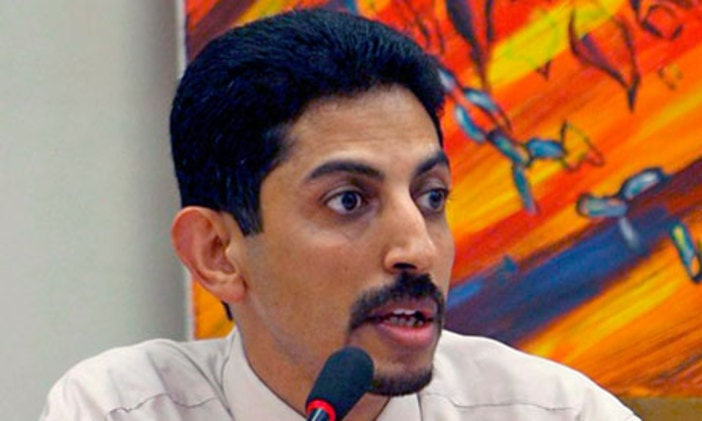Over nine years ago, renowned human rights defender Abdulhadi al-Khawaja was violently dragged from his home in Bahrain, tortured by security services and initially tried as a civilian in a military court. He was sentenced to life in prison under broad legislation on trumped-up charges including ‘participating in terrorism to overthrow the government’. It is widely understood by those both in Bahrain and the international community, that these charges were levelled against Mr Al-Khawaja as a punishment for his peaceful role in the 2011 pro-democracy protests, which called for political reform in the country.
Abdulhadi Al-Khawaja is an internationally recognised Bharani-Danish human rights defender, a founder and former president of the Bahrain Centre for Human Rights (BCHR), and a founding Director of the Gulf Centre for Human Rights (GCHR). He also worked as the Middle East and North Africa Protection Coordinator for Front Line Defenders until February 2011, when he resigned during the popular Bahraini pro-democracy movement.
Exiled from Bahrain, Al-Khawaja began life in Denmark with his wife and four daughters between 1981 and 2001. He received training from the Danish Centre for Human Rights and dedicated his life to achieving social and democratic reform in Bahrain. Bahrain has had the same ruling family presiding over the kingdom since the 18th century and a continuous track record of discrimination against the majority Shia population.
Mr Al-Khawaja is one of a group of 13 political activists (the Bahrain 13) given extremely lengthy prison sentences for exercising their basic rights to freedom of expression, association and peaceful assembly. His trial has been recognised as incompatible with the universal standards of fair trial and due process with his sentencing violating the International Covenant on Civil and Political Rights (ICCPR), of which Bahrain in a signatory.
Mr Al-Khawaja has suffered enormously incarcerated at Jau Prison, where he has been subjected to physical, sexual and phycological torture. Amongst other abuses, this has included severe battery, standing in stress positions for hours on end and sodomisation.[1] After one episode of torture, surgery was needed to implement 18 plates and approximately 40 screws in order to reconstruct his face. Simultaneously he has been denied medical treatment and is arbitrarily forced into solitary confinement for lengthy periods and denied visitors.[2] There is added concern for Al-Khawaja’s deteriorating health in the context of the COVID-19 pandemic, given reports confirming that the virus has spread throughout the prison, contracted by prison staff and inmates alike.
Denmark, a country lauded for its steadfast commitment to human rights as a priority of foreign policy have been disappointingly quiet. For over nine years the governments of Denmark have been aware that a Danish citizen and champion of Danish values has been unfairly imprisoned and subjected to horrific abuse and yet nothing has been done. With both United Nations backing, and international demands for Al-Khawaja’s release, besides supplementary medical reports and detailed accounts of Mr Al-Khawaja’s torture, the Danish government has not been swayed into action.
The EU Sanctions Guidelines clearly present the restrictive measures for the EU Common Foreign and Security Policy and outline a number of legal instruments. A core pillar of the of EU’s overarching objectives include defending democratic principles and human rights, yet there has been a distinct lack of Danish-EU coordination. Denmark’s self-declared position is at the “forefront of the fight for an international set of laws and universal human rights.”[3] Worryingly it appears as though Denmark’s commitment to human rights is purely rhetorical. Denmark has been so far unwilling to use EU leverage or lead the call to impose sanctions on Bahrain. Seemingly it appears as though commercial interests with powerful neighbour states, such as Saudi Arabia and the UAE, have deterred Denmark from pursuing serious action.
While there have been cases of individual efforts from Danish MPs and political parties to highlight the situation, a concerted effort from the country and genuine political will are necessary to resolve this issue. The Danish state has thus far failed to protect a Danish citizen and have shown extreme reluctance to alleviate the situation through engagement at the multilateral level. We are asking that the government honour their commitment to human rights and stand-up for Mr. Al-Khawaja is as a Danish citizen and a human rights defender.
[1] The Bahrain Institute for Rights and Democracy – Abdulhadi Al-Khawaja. Available at: http://birdbh.org/abdulhadi-al-khawaja/ [Accessed: 30/07/20]
[2] Ibid.
[3] Ministry of Foreign Affairs Denmark – Foreign Policy. Available at: https://um.dk/en/foreign-policy/ [Accessed 30/07/20]





